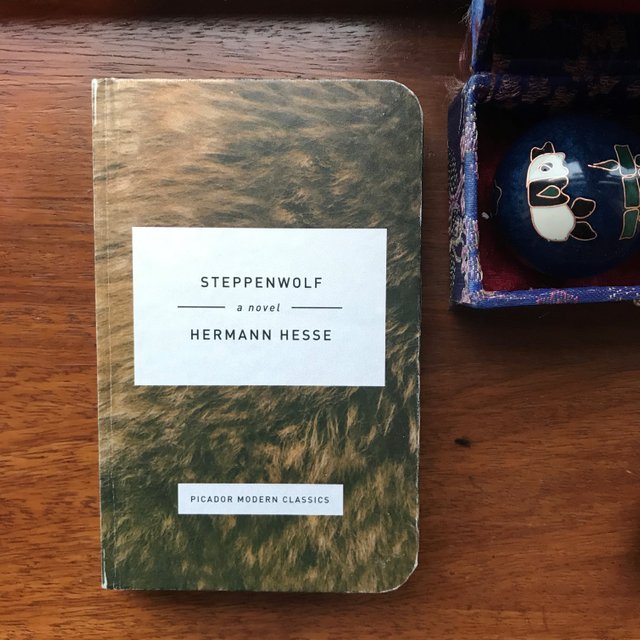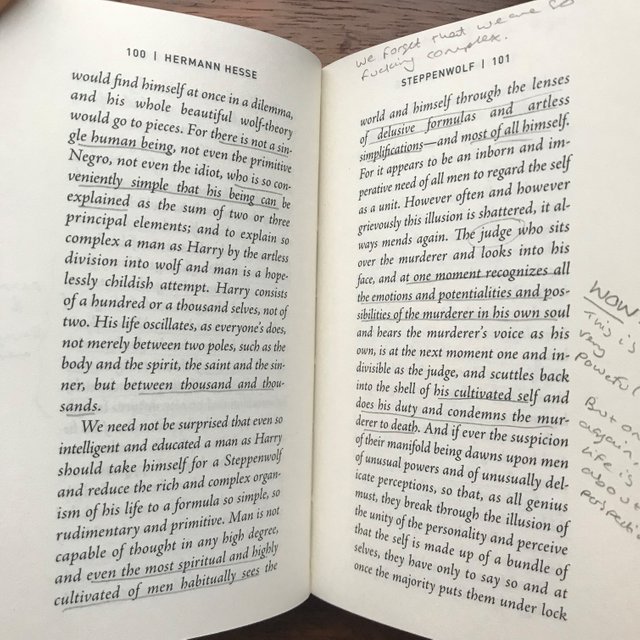Steppenwolf, Hermann Hesse - Bookclub #50

About the Author
Hermann Hesse was born on July 2, 1877, in Calw, Germany. His parents, Johannes and Marie, were of varied European ancestry and had done missionary work in India. Hesse was also expected to pursue a religious career, and at his parents urging he attended the theological seminary in Maulbronn.
But as Hesse would later remark, he did not possess a demeanour compatible with a rigid, often-oppressive educational system, having known from pre-adolescence that he loved poetry. After completing his schooling in 1893, Hesse found work in a bookstore, an antique store and a clock tower factory while he focused on publishing his poems and writing prose.
In the new decade, Hesse continued publishing novellas while earning acclaim for novels such as Siddhartha (1922), set in India during the time of the Buddha and reflecting the author’s own travels. In 1927 he published Steppenwolf (which this review is about), a mystical affair that chronicled the meeting of the despondent Harry Haller with the liberated Hermine. In 1930, the novel Narcissus and Goldmund followed a metaphorical work focusing on the contrasting sensibilities of a teacher and his student.
Hesse took more than a decade to complete his next, last and longest novel, The Glass Bead Game, aka Magister Ludi, which was published in 1943 and tackled the contours of a utopian society. Hesse was awarded the 1946 Nobel Prize in Literature for his body of work, with his health barring him from travelling to Stockholm to attend the ceremony. He died on August 9, 1962, in Montagnola, Switzerland.

A little bit about the book
Steppenwolf is a book about a man called Harry Haller who appears to go through a midlife crisis. He identifies with something he read about called the Steppenwolf because he feels like an outsider, that is cursed with conscious deep thoughts about the dirt of humanity. He is an intelligent man who is well read but has this sense of nihilism in his attitude to everyday life. He finds himself plodding through life, toiling between momentary happiness in vices and situations of comforts and on the other hand living in discontent and depression about himself and about the sick society he lives in.
He has no meaning to his life, no reason to be content, to live in this harsh society he finds himself in. Yet he is too scared to die. This conflict leads him to the feet of a woman called Hermine late one night in a pub. From here, stems a relationship of pushing emotional and physical boundaries as Hermine teaches Harry how to live again, giving him a new lease of life - but it all comes to a dramatic end and has you turning the pages in a mix of surprise, contemplation and apprehension towards the characters in the story.

The book, like a great number of Hermann hesse's books, provide us with important lessons for human beings in the 21st century. About meaning in life, our actions, awareness and perspective.
Sometimes, like Harry Haller the Steppenwolf, we need to be rocked to the core to understand perspective and our chances of living a beautiful life.
The book is a must-read for anyone interested in people, and society itself.
The Bookclub
Ego is the Enemy, Ryan Holiday
The Wisdom Of Insecurity, Alan Watts
Tools of Titans, Tim Ferris
Homo-Deus, Yuval Noah Harari
Radical Acceptance, Tara Brach
Born a crime, Trevor Noah
How brands grow, Byron Sharp
Tales of modern Russia, Peter Pomerantsev
Stone Soup, Marcia Brown
How to get filthy rich in rising Asia, Mohsin Hamid
The Art of War, Sun Tzu
Why Bob Dylan Matters, Richard F. Thomas
On the Shortness of Life, Seneca
Not Fade Away - A short life well lived, Peter Barton
Blockchain Revolution, Alex and Don Tapscott
What I know for sure, Oprah Winfrey
Man's Search for Meaning, Viktor E. Frankl
Creativity Inc., Ed Catmull
Meditations, Marcus Aurelius
The Rational Optimist, Matt Ridley
What Makes Sammy Run? , Budd Schulberg
How to Develop Self-Confidence in Public Speaking, Dale Carnegie
How to Win Friends and Influence People, Dale Carnegie
As a Man Thinketh, James Allen
The Four Agreements, Don Miguel Ruiz
The Magic of Thinking Big, David J. Schwartz
The Great Philosophers, Edited by Ray Monk & Frederic Raphael
The Outsiders, William N. Thorndike
Invested, Danielle & Phil Town
The Last Hours of Ancient Sunlight, Thom Hartmann
The Obstacle is the Way, Ryan Holiday
Zen Flesh, Zen Bones, Paul Reps
The Prince, Niccolo Maciavelli
Think and Grow Rich, Napoleon Hill
Unshakeable, Tony Robbins
The War of Art, Steven Pressfield
Leonardo Da Vinci, Walter Issacson
Onwards, Howard Schultz
The Long and Short of It, John Kay
Prisoners of Geography, Tim Marshall
Total Recall, Arnold Schwarzenegger
Steve Jobs, Walter Issacson
Thus spoke Zarathustra, Freidrich Nietzche
The Everything Store, Brad Stone
Zero to One, Peter Thiel
Zen and the Art of Happiness. Chris Prentiss
The Lessons of History, Will and Ariel Durant
Living with a Seal, Jesse Itzler
The Innovators Dilemma, Clayton M. Christensen
Hi! I am a robot. I just upvoted you! I found similar content that readers might be interested in:
https://www.biography.com/people/hermann-hesse-9337513